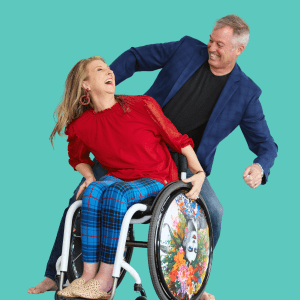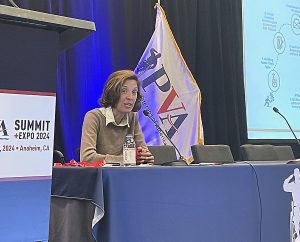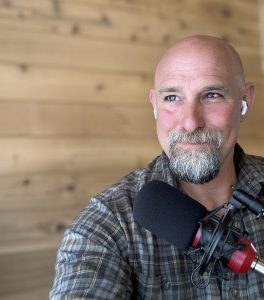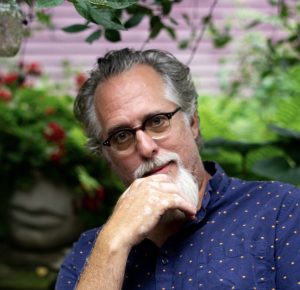Podcasts by and for people with SCI/D cover range of topics
Whether you’re looking for education, inspiration or entertainment, podcasts offer a convenient, portable and engaging way to share and gain knowledge.
Several podcasts hosted and produced by and/or for people with spinal cord injury or disease (SCI/D) were discussed in the August issue of PN. Here are a few more to explore.
LIVING LUCKY
For husband and wife team Jana and Jason Shelfer, Living Lucky isn’t just the name of their podcast – it’s a mindset.
“My hope is that people will start having the awareness and just the noticing of how they can get the feeling that they’re looking for in life and lean towards a feeling of living lucky,” says Jason, a personal development coach. “When you feel like you’re living lucky, you show up differently in life. And when you show up differently in life, you get new results.”

Jana, who sustained a level T4 SCI in a 1990 car accident, attended the University of Illinois and was highly involved in wheelchair sports, including competing for the Team USA women’s wheelchair basketball team at the 1996 Atlanta, 2000 Sydney and 2004 Athens Summer Paralympic Games and earning bronze (Atlanta) and gold (Athens) medals. After moving to Orlando, Fla., in 1998, she became a local radio personality known as Jana Banana and worked on a talk radio show for 12 years, never discussing her disability on air.
Eventually, Jana felt like her off-air experiences in sports and life would be valuable to listeners, so she decided to find a platform that would allow her to combine her broadcasting experience with her love of wheelchair sports and being a champion of disability rights.
The couple, who married in 2006, launched their podcast in 2021 while the world was still grappling with the novel coronavirus (COVID-19) pandemic. They started going live on Facebook from their home in Winter Garden, Fla., to talk about staying positive and using the time at home for self-development.
“It just kind of felt like, oh my gosh, we’re here at home and people need connection, and this is a really great opportunity to start building a community,” Jana says. So, we didn’t do it with the purpose of building a podcast. We did it with the purpose of building just an online community.”
Jana says they originally did interviews because they thought that’s what people wanted, and she’s keeping the door open for that in the future. But they found out their community just liked hearing their banter, details about their relationship and how they work through problems and challenges.
“It’s something that we just do for fun. It’s real life, what things we’re going through and issues that we talk about,” Jason says. “And a lot of times, we have these little disagreements because one of us is planting our feet. You recognize when you’re planting your feet that you’re creating a planting of the feet of the other person.”
Each episode is about 15 minutes long, and they’ve recorded more than 400 episodes. Episodes drop three times a week, and they’ve had a little over 200,000 downloads.
Besides attracting speaking engagements and coaching clients, podcasting gives both Jana and Jason better communication with each other.
“Some people keep all their thoughts in their heads, and they never articulate them, so they never have to get very clear in those thoughts,” Jason says. “And we spend our time articulating a lot of our thoughts just into this podcast world. And it allows us to get super clear and then more directional with what we’re going to do next.”
Jana says in 2026, they might start videotaping the podcasts and reignite their YouTube channel.
The podcast can be found on Apple Podcasts, Spotify and Amazon Music. They also still do Facebook Live every Monday so people can start their week with positivity and intention, Jana says.
For more information, visit startlivinglucky.com.
BARE BONES PODCAST SERIES
For those looking to brush up on their bone health education, a group of medical experts and people with lived SCI experience created the Bare Bones Podcast Series.
Bone health is essential for people with SCI/D to maintain their mobility and independence, especially since studies have shown SCI decreases bone mass. To help, clinicians have access to the Consortium for Spinal Cord Medicine’s Clinical Practice Guideline for Bone Health and Osteoporosis Management for Individuals with Spinal Cord Injury or Disease, which was published in 2022. However, the podcast series was developed to deliver the information in a clear and simplified way so people with SCI/D and their caregivers could understand the clinical practice guidelines (CPG) and know how to act to reduce fracture risk.

The series is co-hosted by two women with SCI, Anita Kaiser, PhD, and Wendy Murphy, a health coach at the University of Toronto.
Kaiser, who spoke during the 2024 Paralyzed Veterans of America Summit + Expo in Anaheim, Calif., about co-designing the podcast series, says everyone should be in the business of fracture prevention.
“Fractures can lead to a number of complications, including blood clots, pressure injuries, depression,” Kaiser says. “The bone may not heal very well or may take a very long time to heal. It can lead to loss of mobility and independence in activities of daily living, which can lead to increase in attendant intensive care, as well as an increase in the risk of mortality.”
Each of the nine episodes is between eight and 15 minutes long and is based on one of the chapters in the CPG. Each episode also has a corresponding handout that provides a summary of the information in the podcast.
“We do recommend listening to the podcast series in order, but you could choose to skip around and listen to specific episodes and then go back and listen to others later,” Kaiser says. “We also really worked at trying to find that healthy balance between providing the information that we wanted to share, but as well the level of detail that they were willing to listen and learn and hear about. And also recognizing that offering it in multiple formats, so both as a podcast but also as a handout, would help to reinforce the information for one another and help with working with different learning styles.”
Kaiser says she and two other individuals with SCI/D went through the CPG to develop interview questions that would provide content and information that’s “need to know” for people living with SCI/D. Then, they conducted orientation sessions with their guest speakers, all of whom helped write the CPG chapters. Prior to recording the episodes, the hosts and guest speakers went through the interview questions and guest speakers’ prepared responses to make sure they were phrased in simple, easy-to-understand terms. Each episode ends with a key action item or take-home message for listeners to consider.
“We hope that it’ll help with people with spinal cord injuries and their family caregivers to advocate for ongoing bone health assessments, promote dialogue with their care team regarding fracture prevention and really empower patients to act to improve their bone health and reduce their fracture risk,” Kaiser says.
The podcast series is available on YouTube Music and Spotify. For more information, visit scifragments.ca.
CURECAST
Advocacy for SCI research is at the heart of the CureCast podcast, sponsored by Unite 2 Fight Paralysis.
Matthew Rodreick and Jason Stoffer co-host the podcast, which started in 2018, shortly after Rodreick took over as the executive director of Unite 2 Fight Paralysis. Stoffer joined in 2019, replacing former co-host Kate Willette. Their interviews consist mainly of scientists, advocates, clinicians and funders of SCI research.
“On the one hand, it was a tool to educate our community of people living with spinal cord injuries to give them sort of an inside view of research and even ways in which other advocates in the community are influencing research,” says Rodreick, whose son, Gabriel, sustained a level C5 SCI at age 16 while body surfing in Costa Rica in 2008. “But it also works in the other direction, to educate scientists on sort of who the community is and what they value and how they think about research.”

Stoffer, who sustained a level L1 SCI in a vehicle rollover in 2017 and has a background in biology, says finding a balance with two interviewers can be a challenge. But he and Rodreick work well together.
“I want to get to the important points and I want to move on,” Stoffer says. “But Matthew brings this, I would call it like a magic or, like, a philosophical tone or, like, ‘Hey, let’s see where this conversation leads and let’s see what we forgot to add in the outline, or let’s see if we can expand on this point.’”
Rodreick lives in Minneapolis, and Stoffer lives in Eureka, Mont., so they record the podcast on their laptop computers and have a part-time producer who manages the audio. Dropping new episodes every two weeks on Fridays, they have amassed about 900 subscribers and about 110,000 streams across about 80 countries.
They try to keep episodes to an hour each, but Rodreick says they’ll sometimes do a series on a particular subject, such as sexuality after SCI.
“In spinal cord injury research, there’s very, very little being done on sexual function, and much of what is being done is on fertilization, on getting pregnant, or for males, mechanical ejaculation,” Rodreick says. “But there’s very little attention paid, partly due to the complexity, on pleasure. And so that was very important.”
For others with SCI/D who’d like to get into podcasting, Rodereick says to listen to other podcasters to find out if something is missing from the dialogue, and Stoffer says to figure out your message and stick to it.

“For some people, it could just be about stories, right?” Stoffer says. “For some people, it could be about advocacy. For some people, it could be practical aspects or self-care, whatever it is. But find your niche, find your message, and then be your audience and speak to your audience.”
Stoffer and Rodereick say their ultimate goal is to work themselves out of a job – to cure SCI and not have a podcast anymore – which can only happen if people understand the research and get involved.
“What we’re trying to do is we’re trying to do is give our community a voice and education and an opinion on why this functional recovery is so important,” Stoffer says. “It’s not just about access, and it’s not just about more ADA [Americans with Disabilities Act] parking spaces, even though those things are important. Trying to get this, like, one team, one fight attitude together to make change is our goal.”
The podcasts are available on Spotify, Apple Podcasts and Soundcloud.
For more information, visit u2fp.org/get-educated/curecast/all-episodes.html.
